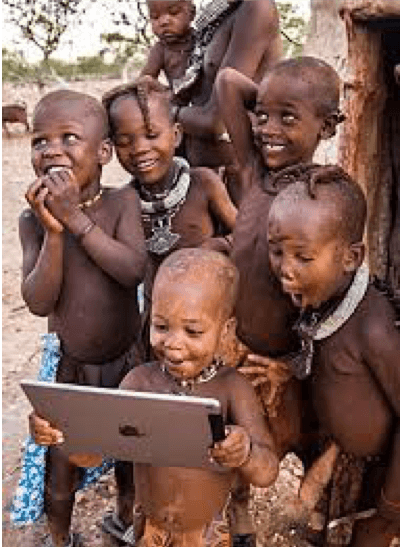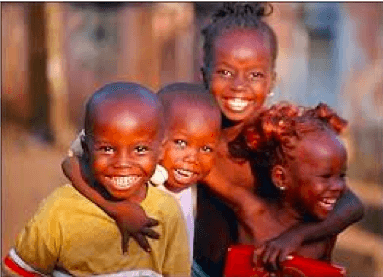The Infectious Smiles of Africa – A Lesson for Human Compassion
My experiences with the African people began with an excursion to Northern Africa. I spent some time in several of the northern African countries and met some wonderful people, particularly children. I was told to take pencils with me when I visited the local villages. The moment I took the pencils out of my satchel, I was surrounded by youngsters. Their smiling, wide eyes, radiated sunshine and their squeals of laughter made one overcome with pure happiness! It was a delight to see the joy in these children’s eyes and what a gift of a simple pencil could mean. Perhaps this was a moment of Ubuntu, a bit of humanity in the smallest form. There was no language barrier, no ethnic or cultural challenges, no social or political platform, only a simple gesture that warmed the heart and made a connection to all people.
This was a good example of a high context culture, one that values interpersonal relationships, as Moran, Abramson and Moran describe this in chapter 15 of their book “Managing Cultural Differences”, high context culture as seen in the African society, it is one that does not come from words, rather internalized in the person (Moran, et al, 2014, p.534). The Africans tend to be more human oriented, valuing the extended family and sharing with all. As a leader, working in Africa or with the people Africa, you need to understand this philosophy.

Boyd Varty discuss Ubunto via a Ted Talk presentation as Africa being a harsh place, “I also know it to be a place whose people, animals and ecosystems teach us about a more interconnected world,” says Varty. “[Nelson] Mandela said often that the gift of prison was the ability to go within and to think, to create within himself the things he most wanted for South Africa: peace, reconciliation, harmony. Through this act of intense open-heartedness, he was to become the embodiment of what in South Africa we call Ubuntu. ‘I am; because of you.” Ubuntu is a beautiful concept and can be translated as “human kindness,” but its meaning is much bigger in scope than that — it embodies the ideas of connection, community, and mutual caring for all (May, 2014).
In a recent position I held, I was reintroduced to those African smiles and the human connection those smiles shared. Working with a global organization, one will encounter much diversity. Understanding these differences, will help understand who you are working with. According to Hofstede Insights, much of the continent of Africa is considered a collective society, which is why family, extended family and building good relationships is imperative to success in business dealings. They also have a low score in long term orientation, perhaps it is because tradition is important and change leads to some suspicion. Uncertainty avoidance varies, but is more on the higher end, meaning these people feel threatened in certain situations and the future has much unknown attached to it. Africa has seen its share of issues; famine, sickness, disease, poverty, military and political extremism, corruption and conflicts (Moran, et al, p. 505). Which brings me back to those smiles and the lessons they taught me.
Egypt – Blue, Morocco – Purple, Mozambique – Green, Nigeria – Orange
Hofstede Insight
Every time I was greeted by these employees, they received me with a big smile and a nod of the head, sometimes an embrace or hand clasping, but those smiles were so contagious. And I wondered what was behind those smiles. Each having their own story to tell.
Binta was a good employee, I always admired her head wraps and commented on them daily, she always flashed her super smile back at me. But one day did not come to work, she had to head back to her village to take care of an ailing family member. I could hear her smile in her voice as she told me what was happening and that she was sorry but needed to do this. Three years later, she came back looking for a job, when she saw me, she burst out in that smile and her eyes danced with delight, she was hired back and went to the job she had prior to leaving, looking like she never skipped a beat and still wearing those colorful head wraps.
job she had prior to leaving, looking like she never skipped a beat and still wearing those colorful head wraps.
Taalib was heading to his village, to get married in his traditional tribal fashion, he never meet the girl, but had a big smile on his face as he told me about those traditions. When he returned from his marriage ceremony, he came alone, his new bride stayed back in his village with family. I looked at him with sad eyes and he said “Miss Deb, no worries”, and broke out a big smile. “I work hard here and next year will bring her here to live with me, in a new home and my family too. I will see her soon”. He did 18 months later.
I was interviewing Abede for a new job and asked him about a difficult situation he had to deal within the work environment. What was it? How did he handle it and what was the outcome? He explained to me he was an engineer working in a large production facility in his country, one day the military came in and starting shooting everything in sight, he crawled on his belly to hide for his safety and waited many hours until he felt it safe to run away. He ran away that day and came to this country with barely any of his own belongings. I was speechless. He looked at me and smiled and said Miss Deb, “I am ok, my family is ok and we are living a good life today” and thanked me.
Neema had not seen her family in 5 years, they were finally coming for a visit and she hoped they would stay. She was full of smiles telling me about her town and where her family had lived and what they did in their country and the pride of her telling me about family and traditions was priceless.

And finally, I had Malik and Tariq, brothers who had been living in America several years now. The eldest, Malik, was heading back to his village to help his family, as there was civil war brewing there and he wanted to defend his village. A few short weeks later, the younger brother left to help fight as well. When they both talked to me, they told me I was not to worry about them, they would be fine. Both giving me a laugh and a big smile showing their confidence and said they would see me in three months. They returned three month later, flashing their wonderful smile and returned to their work like they never had left it.
There were more Bintas, Taalibs, Abedes, Neemas, Maliks and Tariqs, all flashing their smiles, eyes always twinkling, each with a story to share; some exciting, some scary, some funny, and some horrific, but they never stopped smiling. Helping to understand their plight and respecting them for who they were and what they believed in, helped me to build a strong rapport of trust and respect that I had with these employees. In turn, they helped me look at things differently, all by an infectious smile.
Behind those smiles, was hiding so many untold memories of suffering, heartache, disappointment, chaos, incivility, sadness, sickness, hunger, darkness, and hardship. In spite of those issues, these people showed me that they are strong and resilient, full of hope, happiness, love, and peacefulness within this world. As leaders, we also need to understand the human connection and how we can be part of the Ubuntu concept. A smile is a lesson in Ubuntu, I am because of you and we all need some human compassion. A smile truly can say a thousand words in any language!
References:
Country Comparison. (n.d.). Retrieved from https://www.hofstede-insights.com/country- comparison/egypt,morocco,mozambique,nigeria/
I am, because of you: Further reading on Ubuntu. (2017, June 21). Retrieved from https://blog.ted.com/further-reading-on-ubuntu/
Moran, R. A., Abramson, N. R., & Moran, S. V. (2014). Managing cultural differences (9th ed.). New York, NY: Routledge.
Penn State University. (2018). Lesson 14: Africa Retrieved from https://psu.instructure.com/courses/24935460











 Kaizen
Kaizen






